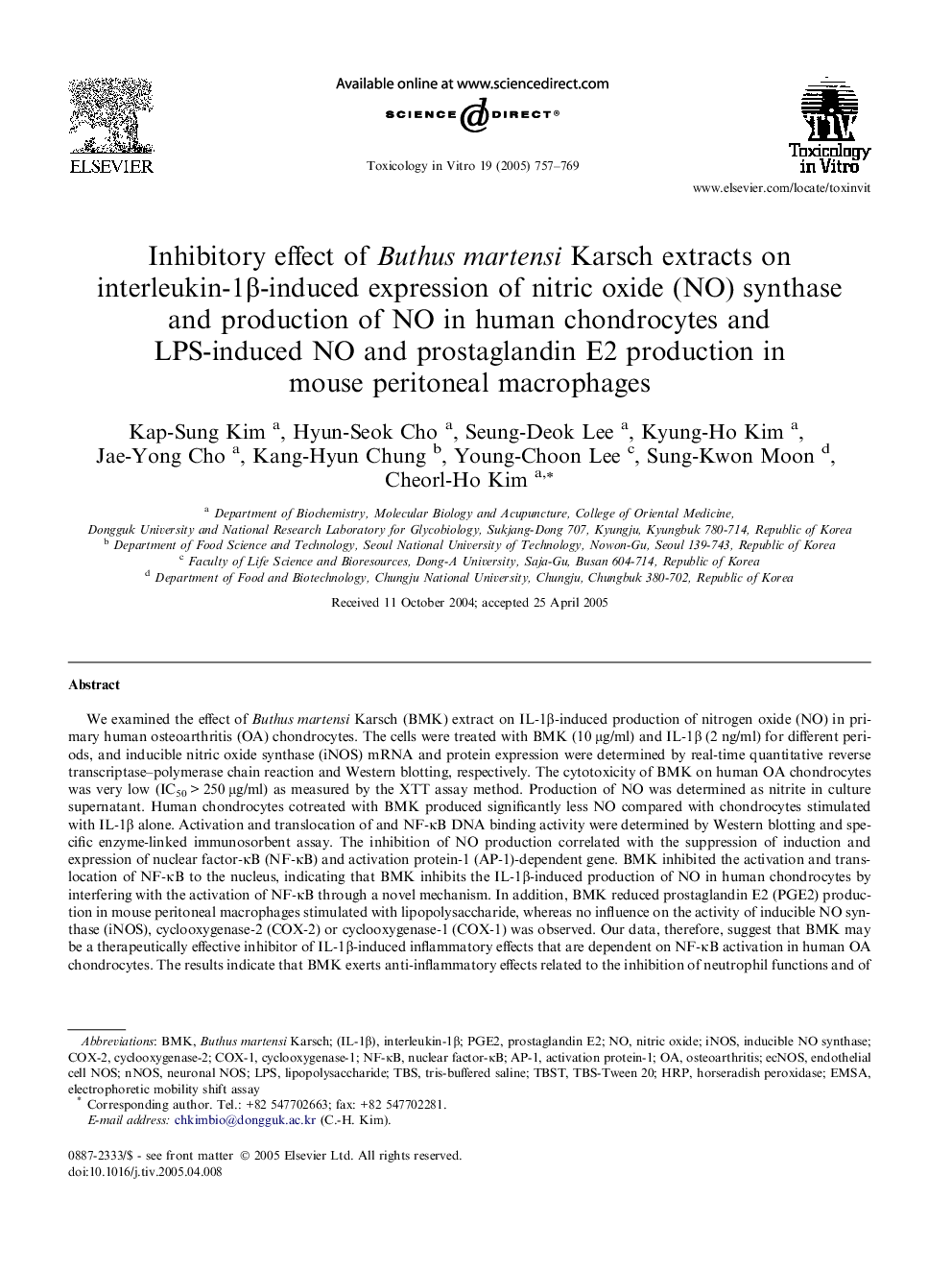| Article ID | Journal | Published Year | Pages | File Type |
|---|---|---|---|---|
| 9038408 | Toxicology in Vitro | 2005 | 13 Pages |
Abstract
We examined the effect of Buthus martensi Karsch (BMK) extract on IL-1β-induced production of nitrogen oxide (NO) in primary human osteoarthritis (OA) chondrocytes. The cells were treated with BMK (10 μg/ml) and IL-1β (2 ng/ml) for different periods, and inducible nitric oxide synthase (iNOS) mRNA and protein expression were determined by real-time quantitative reverse transcriptase-polymerase chain reaction and Western blotting, respectively. The cytotoxicity of BMK on human OA chondrocytes was very low (IC50 > 250 μg/ml) as measured by the XTT assay method. Production of NO was determined as nitrite in culture supernatant. Human chondrocytes cotreated with BMK produced significantly less NO compared with chondrocytes stimulated with IL-1β alone. Activation and translocation of and NF-κB DNA binding activity were determined by Western blotting and specific enzyme-linked immunosorbent assay. The inhibition of NO production correlated with the suppression of induction and expression of nuclear factor-κB (NF-κB) and activation protein-1 (AP-1)-dependent gene. BMK inhibited the activation and translocation of NF-κB to the nucleus, indicating that BMK inhibits the IL-1β-induced production of NO in human chondrocytes by interfering with the activation of NF-κB through a novel mechanism. In addition, BMK reduced prostaglandin E2 (PGE2) production in mouse peritoneal macrophages stimulated with lipopolysaccharide, whereas no influence on the activity of inducible NO synthase (iNOS), cyclooxygenase-2 (COX-2) or cyclooxygenase-1 (COX-1) was observed. Our data, therefore, suggest that BMK may be a therapeutically effective inhibitor of IL-1β-induced inflammatory effects that are dependent on NF-κB activation in human OA chondrocytes. The results indicate that BMK exerts anti-inflammatory effects related to the inhibition of neutrophil functions and of NO and PGE2 production, which could be due to a decreased expression of iNOS and COX-2 through the transcription factors NF-κB and AP-1.
Keywords
NF-κB(IL-1β)TBSTAP-1nNOSIL-1βInducible NO synthase (iNOS)PGE2iNOSCOX-1Cyclooxygenase-2 (COX-2)Cyclooxygenase-1 (COX-1)COX-2HRPTBSButhus martensi KarschEMSALPSecNOSinducible NO synthaseneuronal NOSElectrophoretic mobility shift assayOsteoarthritisInterleukin-1βBmkTris-buffered salineCytokinecyclooxygenase-1Cyclooxygenase-2nuclear factor-κBlipopolysaccharideMacrophageNitric oxideNitric oxide (NO)Horseradish peroxidaseactivation protein-1Prostaglandin E2Prostaglandin E2 (PGE2)Chondrocytes
Related Topics
Life Sciences
Environmental Science
Health, Toxicology and Mutagenesis
Authors
Kap-Sung Kim, Hyun-Seok Cho, Seung-Deok Lee, Kyung-Ho Kim, Jae-Yong Cho, Kang-Hyun Chung, Young-Choon Lee, Sung-Kwon Moon, Cheorl-Ho Kim,
